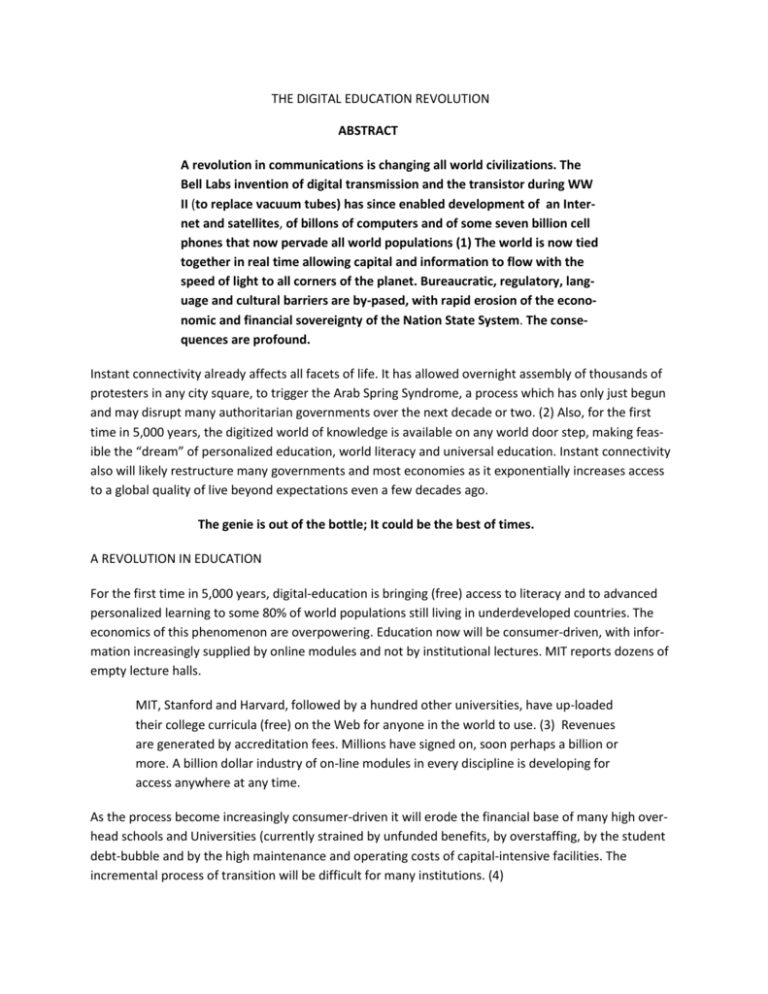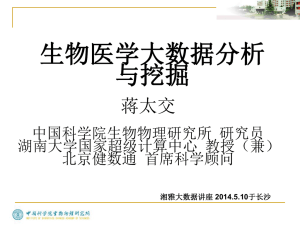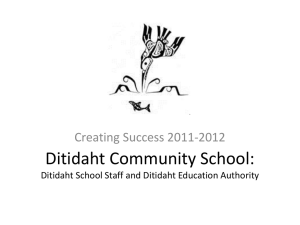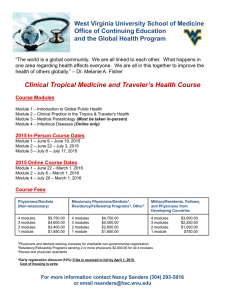THE DIGITAL EDUCATION REVOLUTION ABSTRACT A revolution
advertisement

THE DIGITAL EDUCATION REVOLUTION ABSTRACT A revolution in communications is changing all world civilizations. The Bell Labs invention of digital transmission and the transistor during WW II (to replace vacuum tubes) has since enabled development of an Internet and satellites, of billons of computers and of some seven billion cell phones that now pervade all world populations (1) The world is now tied together in real time allowing capital and information to flow with the speed of light to all corners of the planet. Bureaucratic, regulatory, language and cultural barriers are by-pased, with rapid erosion of the econonomic and financial sovereignty of the Nation State System. The consequences are profound. Instant connectivity already affects all facets of life. It has allowed overnight assembly of thousands of protesters in any city square, to trigger the Arab Spring Syndrome, a process which has only just begun and may disrupt many authoritarian governments over the next decade or two. (2) Also, for the first time in 5,000 years, the digitized world of knowledge is available on any world door step, making feasible the “dream” of personalized education, world literacy and universal education. Instant connectivity also will likely restructure many governments and most economies as it exponentially increases access to a global quality of live beyond expectations even a few decades ago. The genie is out of the bottle; It could be the best of times. A REVOLUTION IN EDUCATION For the first time in 5,000 years, digital-education is bringing (free) access to literacy and to advanced personalized learning to some 80% of world populations still living in underdeveloped countries. The economics of this phenomenon are overpowering. Education now will be consumer-driven, with information increasingly supplied by online modules and not by institutional lectures. MIT reports dozens of empty lecture halls. MIT, Stanford and Harvard, followed by a hundred other universities, have up-loaded their college curricula (free) on the Web for anyone in the world to use. (3) Revenues are generated by accreditation fees. Millions have signed on, soon perhaps a billion or more. A billion dollar industry of on-line modules in every discipline is developing for access anywhere at any time. As the process become increasingly consumer-driven it will erode the financial base of many high overhead schools and Universities (currently strained by unfunded benefits, by overstaffing, by the student debt-bubble and by the high maintenance and operating costs of capital-intensive facilities. The incremental process of transition will be difficult for many institutions. (4) -2Several largely independent market segments will emerge at different rates and disruptive innovations realize their greatest success in markets where no alternative exists. (a) The largest market will be in the developing world, where there is no real alternative and where there exists an insatiable demand for learning. For the first time in 5,000 years, world literacy and an educated population can now emerge. A multiple billion industry for online modules will develop to feed this online process.. (b) A second involves a steadily growing need for lifelong-adult continuing re-education. Continuous re-skilling or an advanced degree may be desired, as any set of skills can now become obsolescent in just a few years. (c) The third involves the restructure of Free World existing educational institutions, unchanged in 50 years. The U.S. record of scholastic achievement is not good. A third of all students drop out of high school, a third of college students require remediation and 46% don’t graduate. The Free World market will be the slowest to respond to disruption of imbedded cultural and pedagogical patterns. The change to digital education will be urgent, but many schools, colleges and universities may not survive the transition. The process of education will now be transformed for the first time from partial mastery in a rigid classroom time frame, to the “dream” of total mastery in a flexible place and time frame. Inverted instruction or “flipped classrooms” already are providing pre-recorded video lectures and self-selected content-delivery of facts and data for home consumption, followed by institutional organized small group discussions, team problem-solving and individualized teacher-mentoring ”Teacher-entrepreneurs” are developing home leadership roles outside the classroom, providing personalized student guidance and mentoring assistance. (5) The quality of many online modules already far exceeds lecturehall presentation. However, the need to transform existing lecture halls and many traditional facilities and procedures to new uses will be barriers to change. The school function itself may morph into small group problem-solving sections where students learn how to apply what they have studied. Departmental structures, and teacher tenure traditions may disappear and many faculty members may not be able to adjust. A major barrier to change is that educational systems currently contain large numbers of “educators” who never teach, and have political agendas that are out of sync with learning. Online learning will accelerate inevitable changes. An emerging culture of technology-driven change will require professional development courses. The apprentice-model at post-doctoral levels still works well in graduate schools, but teaching thousands (millions) of students will require a cadre of teaching and learning fellows, trained in the steps needed to change a lecture course to the new model. -3SUMMARY “Instant connectivity” has now made-accessible the entire world base of recorded knowledge on any world doorsrep. Access is through the rapidly developing medium of online modules in every discipline. The potential now exists for the first time in 5,000 years to achieve world literacy and an educated world population, leading to release in all emerging economies of long repressed genetically hardwired desires for personal autonomy, political freedom of expression and an increased quality of life. However, instant connectivity will be disruptive. It has already triggered the Arab Spring Syndrome which may continually undermine many authoritarian regimes. It also will restructure most economies and shift control of education from institutions to individual consumers. The economics are over-powering and many tuition-dependent educational institutions may not survive. Lecture halls and faculty tenure may disappear into diverse formats of community-based types of input, personalized discussion, guidance, and mentoring. Lifelong continual reskilling and re-education will be increasingly required as skill sets become obsolescent in a restructuring world. It could be the best of times ____________________________________________________________________ D. Bruce Merrifield Former V. P Technology Occidental Petroleum Co. Undersecretary U.S Department of Commerce. For Technology and Economic Affairs, Reagan Administtration; Chaired Professor of Management, Entrepreurship, Emeritus, Wharton School of Business University of Pennsylvania. REFERENCES !1) Communications Revolution; MIT Technology Review, Vol. 16, No 1, (2013) pp 61-4; Norman Augustine, Science, Vol 39, January 25, 2013 pp 373. (2) Arab Spring Syndrome; D. Bruce Merrifield, “Entrepreneueship in the Anthropocene Era; It Could Be the Best of Times” Chapter VI, Amazon (2014) (3) MIT, Sanford, Harvard Online Curricula (4) Demise of Institutional Control; J.Fubino, “The coming Higher Education Bust.” http//dollar collase.com/the-coming-higher-education-bust (5) Teacher Entrepreneurs; Appleby, Thomas and Walsh, “Digital Culture &Education,” Vol 2 No.2 pp124-7 (2010)








